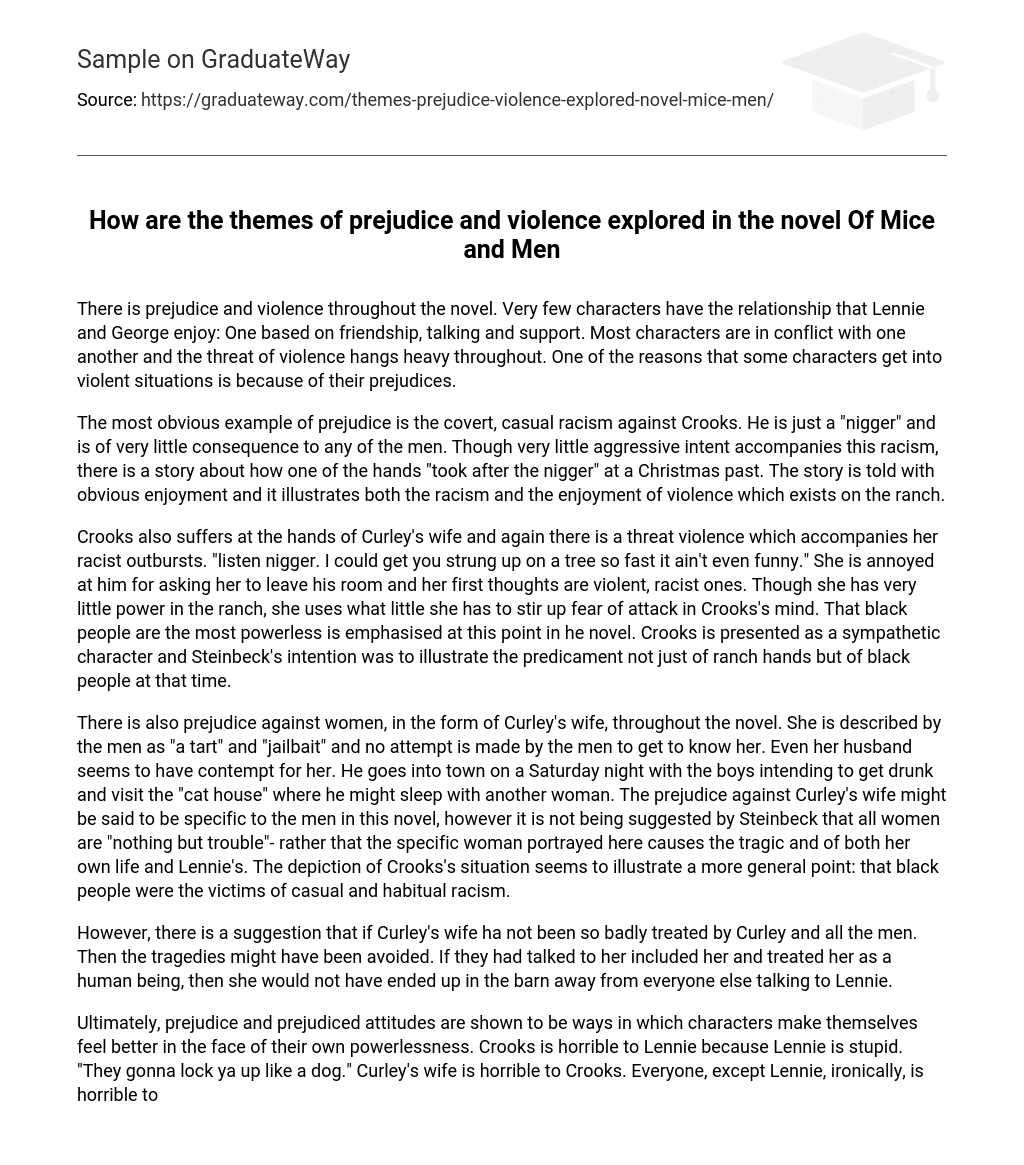There is prejudice and violence throughout the novel. Very few characters have the relationship that Lennie and George enjoy: One based on friendship, talking and support. Most characters are in conflict with one another and the threat of violence hangs heavy throughout. One of the reasons that some characters get into violent situations is because of their prejudices.
The most obvious example of prejudice is the covert, casual racism against Crooks. He is just a “nigger” and is of very little consequence to any of the men. Though very little aggressive intent accompanies this racism, there is a story about how one of the hands “took after the nigger” at a Christmas past. The story is told with obvious enjoyment and it illustrates both the racism and the enjoyment of violence which exists on the ranch.
Crooks also suffers at the hands of Curley’s wife and again there is a threat violence which accompanies her racist outbursts. “listen nigger. I could get you strung up on a tree so fast it ain’t even funny.” She is annoyed at him for asking her to leave his room and her first thoughts are violent, racist ones. Though she has very little power in the ranch, she uses what little she has to stir up fear of attack in Crooks’s mind. That black people are the most powerless is emphasised at this point in he novel. Crooks is presented as a sympathetic character and Steinbeck’s intention was to illustrate the predicament not just of ranch hands but of black people at that time.
There is also prejudice against women, in the form of Curley’s wife, throughout the novel. She is described by the men as “a tart” and “jailbait” and no attempt is made by the men to get to know her. Even her husband seems to have contempt for her. He goes into town on a Saturday night with the boys intending to get drunk and visit the “cat house” where he might sleep with another woman. The prejudice against Curley’s wife might be said to be specific to the men in this novel, however it is not being suggested by Steinbeck that all women are “nothing but trouble”- rather that the specific woman portrayed here causes the tragic and of both her own life and Lennie’s. The depiction of Crooks’s situation seems to illustrate a more general point: that black people were the victims of casual and habitual racism.
However, there is a suggestion that if Curley’s wife ha not been so badly treated by Curley and all the men. Then the tragedies might have been avoided. If they had talked to her included her and treated her as a human being, then she would not have ended up in the barn away from everyone else talking to Lennie.
Ultimately, prejudice and prejudiced attitudes are shown to be ways in which characters make themselves feel better in the face of their own powerlessness. Crooks is horrible to Lennie because Lennie is stupid. “They gonna lock ya up like a dog.” Curley’s wife is horrible to Crooks. Everyone, except Lennie, ironically, is horrible to Curley’s wife. They all try to raise their self-esteem by taking out their bitterness on someone less powerful than themselves.
Violence, too, permeates the novel. The ending is violent- George shoots Lennie. The events leading up to this are also violent- Lennie Kills Curley’s wife. There are other examples of violence throughout the novel. Curley attacks Lennie- “come on ya big bastard” after being told by Carlson that he would “kick (Curley’s) god damn head off” if he went near him. Curley’s wife uses the threat of violence against Crooks. Even the language used by George is aggressive and violent- “Jesus Christ you’re a crazy bastarsd” he says to Lennie. He often abuses him and speaks aggressively, though as we come to know him we realise that he is not really angry with Lennie- it’s the situation which makes him angry. He even uses the aggressive language in a tender way. “”Poor bastard.” He said softly.”
What is strange overall about the violence is in the novel is it is seen to conclude problems between Characters, almost as if it is a solution, Surely Steinbeck cannot be endorsing it as a way of settling disputes or problems?
Yet, when Lennie crushes Curley’s hand, that is the end of another and Lennie does not get “canned” by the boss. Curley’s resentment does lead however, to George having to kill Lennie to avoid Curley doing it.
George kills Lennie at the end of the book. In doing so he solves the problem that Lennie has always been. He no longer has to look after him. Is Steinbeck saying that violence is the correct resolution to situations? Probably not. Steinbeck does not glory violence. The description of the violence is understated. “He pulled the trigger,” is how Lennie’s death is described and even the crushing of Curley’s hand is not vividly described.
Steinbeck writes about the violence because. Like prejudice, it is always there, neither to be applauded nor disregarded. George hates what he has to do, whereas characters like Carlson enjoy the violence they see. “I’d like to see this” he says as Curley goes out to see slim in the barn.
Steinbeck writes to try and show things as they are. We are not allowed to forget that the killing of Lennie is a tragedy. Steinbeck does not seek to endorse violence but neither does he shy away from the fact that it exists.





